- Home
- Gerald Hammond
The Revenge Game Page 2
The Revenge Game Read online
Page 2
Wallace, for his part, saw in Keith a man with an athletic spring in his movements and the sort of dark handsomeness that men think of as being attractive to women.
‘I’m Keith Calder,’ Keith said.
They shook hands, and in the gesture formed one of those spontaneous, uncritical but untrusting male friendships that women find incomprehensible.
‘I know who you are,’ Wallace said. ‘I’ve been in your shop a few times. That very pretty girl with the beautiful –’
‘My wife,’ Keith said quickly.
‘– with the very beautiful smile served me, but I saw you in the background.’
‘I suppose I’ve seen you too. I’ve certainly seen barges plying the canal.’
‘Only one. This is the last barge left. I haul f-fine sand from Alknowes up to the concrete factory in the big quarry at Kalehead.’
‘You don’t strike me as being one of the boat people,’ Keith remarked.
‘I wasn’t born to it. I used to be an accountant. But I was in an accident,’ Wallace held up his right hand from which three fingers were missing, ‘and I got a handsome settlement from the insurance people. But who wants an accountant who can’t write? I’ve learned to d-do a sort of scribble with my left hand, but a child of three could do better. So my employers pushed me into accepting a tiny pension and a medical retirement.’
‘That was tough!’
‘Best thing that ever happened to me. I thought I’d like a change to a more active, outdoor life. Something that would keep me going until I made up my mind what I really wanted to do. The owner of Merganser was ageing, so he sold her to me, and I’ve never regretted it.’ Wallace sighed. ‘I never d-did find anything I really wanted to do.’
Keith noticed that, as the adrenalin left the other man’s bloodstream, a slight natural stammer began to show.
Wallace pulled at his sodden clothes. ‘I’d better see if I can find something d-dry,’ he said. ‘But when we were pooped, most of the water took a short cut through the cabin hatchway.’
‘I’ll leave you to get on with it,’ Keith suggested without moving.
‘No, d-don’t go,’ Wallace said quickly.
‘You need a hand with something else?’
‘It’s not that.’ Wallace looked harassed. ‘I think the breach in the canal-bank’s away beyond the town, but a hell of a lot of water went over below the lock. When people have got over the immediate shock and urgency, they’re going to come looking for a reason.’
‘And that’s you?’
‘Not really. But I did t-touch the lock-gates, just b-before they went. No more than a nudge. But I thought that if there was somebody local with me . . .’ His voice trailed away. He knew that he was bad with people. He was sure that Keith would think him a worm.
‘All right,’ Keith said. ‘I can hang on for a bit, until some other chaperone comes along.’
‘Thanks. Er . . . nobody was killed, were they?’
‘Not that I’ve heard of.’
Wallace disappeared down the hatchway, and Keith could hear him making noises of distress as he surveyed the damage.
Keith looked around. A current was still running in the few inches of water that wandered along the bed of the canal. The rush of water had carried away most of the mud, exposing the puddle-clay lining. Already small boys were playing, rooting for treasure on the canal bottom, and Tanya was hunting fish. Further away, out of Keith’s sight, one small boy was descending under the canal bridge. Some white shapes protruding from a slurry of mud had caught his attention.
The barge, Keith noticed, was an English ‘narrow boat’, painstakingly decorated in the traditional manner, all in primary colours, even to the water cans on deck. Geometric designs predominated, and flowers, and on the doors were identical paintings of a scene with a castle, a lake and a boat. The brasswork was brightly polished, even the bands on the small chimney. The plaited rope fenders at stem and stern had been scrubbed clean.
‘Is transport by water still economic?’ Keith asked.
Wallace’s voice came muffled up the hatchway. ‘Not really. I’m b-becoming more competitive again as fuel prices go up. As long as I b-break even and keep my capital intact, I’m not c-complaining. I don’t need much. I carry stuff for the farmers and they give me vegetables, or meat if they’ve slaughtered a beast. I pot the occasional bunny or a duck as I go along, and I get a trout or two out of the loch.’
Keith felt a twinge of nostalgia. He had been itinerant and single in his time. He wondered whether Wallace had a wife at each end of the canal. ‘Can you shoot all right with that hand?’ he asked.
‘Left-handed, but I’ll surprise you one of these days,’ Wallace said. ‘Of course, the firm pays me a better rate than they’d have to give a road-haulier, but I think they like to be able to use me in their publicity. You know the sort of thing. Only horse-drawn b-barge still plying the waterways of B-britain.’
‘Horse?’ Keith said.
Wallace’s head popped out of the hatch. His hair was tousled, and he was stripped at least to the waist. His torso was bronzed but gaunt. ‘Christ! I suppose Caesar’s still standing back at the lock. What a bloody mess!’ He disappeared again.
Keith took pity on him. ‘You’re going to be here quite a while, aren’t you?’
Up from the cabin came a sigh. ‘Months. Even if they repaired the canal-bank and the lock tomorrow, which they won’t, it’d take weeks for the c-canal to fill again.’
‘Then let’s get you sorted,’ Keith said. ‘If your cabin’s been swamped, you can’t live in it just yet. You need time and space to dry your things out. The flat over my shop’s empty, which I don’t like because there’s nobody there to hear a break-in. Like to use it for a while? No charge.’
‘Blessings on you, my noble benefactor,’ Wallace said awkwardly. He came up on deck. Keith guessed that, lacking dry working clothes, Wallace had put on his holiday shore-going attire of well-pressed fawn slacks and a thin, polo-necked sweater of some autumn colour. With his hair now brushed, he looked more believable as an accountant than as a bargee. ‘It would give me a chance to paint out the cabin,’ Wallace said. ‘And maybe, while she’s dry, I can get some work done on her bottom and save hauling her out.’
‘Glad to help,’ Keith said.
‘I’d better g-get somebody to pasture Caesar.’
‘And here comes somebody who can help,’ Keith said. Janet Weatherby was coming along the towpath, young, blonde and succulent. ‘Her father lost some cattle to brucellosis, so he’s got some spare pasture.’
The young boy by the bridge had found something more interesting than a collection of old bones. The state of his clothes was to reduce his mother to a state of impotent hysteria, but he did not care. Searching diligently through a mudbank that had survived in a back-eddy from the bridge, he had spotted something. At first, he thought that it was no more than a stick or a piece of pipe protruding from the mud, but he pulled it out anyway.
Chapter Three
It took the local mallard population a day and a night to discover what perfection of habitat had been created by the new flood. Then they came pouring in to where Sinclair’s barley had been. At dusk on the second day, and again for a brief period the following dawn, four guns reaped a worthwhile harvest.
While the rest of Newton Lauder was at breakfast, Keith, Ronnie, Sir Peter and Janet Weatherby, already filled with bacon and bonhomie, were plucking and cleaning in the former kitchen of Briesland House, now reduced to a utility room. Janet had been roped in as being one of the few competent shots who could be available at dawn on a weekday, to cover the fourth strategic point on the margin of the new pond.
Molly was another competent shot and given a day at the rabbits could bowl them over with the best, but her tender heart drew the line at shooting ducks. She had joined the plucking party in what was, for her, a morose mood. She hated the approach of winter, not for climatic reasons but because it was the season for waking up alone
in a cold bed and for being left in sole charge of the shop for days at a time. But Molly was in a minority. The other four were elated and Tanya, towelled but still smelling strongly of damp dog, was dreaming dreams of glory.
‘If duck were only pigeon,’ Molly said, resting her tired fingers, ‘they’d pluck a damned sight easier. Give a cushat a good shake and the job’s half done.’
‘If they were pigeon, they’d taste like pigeon,’ Janet pointed out.
A friendly and familiar argument was in progress as to the relative merits of skinning as against plucking when there was a sharp rap at the outside door. Keith, who was nearest, reached out and turned the handle. ‘Come in,’ he said.
Two men in uniform answered his invitation. The taller Keith recognised as his least favourite policeman, Chief Inspector Munro. Keith’s relationships with the local police were in general good and occasionally roisterous, but the chief inspector, a dour Hebridean, had a deep-rooted dislike of firearms and of all who deal in them, and in particular for Keith Calder. Keith, for his part, considered the chief inspector to be a nit-picking, pettifogging bureaucrat not fit even to direct traffic. Since neither had made any secret of his views, their feud had smouldered and flared for years.
The sergeant accompanying Munro was also known to Keith. Sergeant Ritchie was as broad as his superior was lean and as rubicund as Munro was sallow; Keith had always liked him without knowing him well.
‘Is it too late to change my mind?’ Keith asked.
Munro smiled a smile as bleak as his native hills. ‘I had hoped to see you alone,’ he said. His voice had the careful lilt of the West Highlander who still thinks in Gaelic.
‘These are my friends,’ Keith said, ‘but if I come away now I’ll find that I’ve been left with all the small ones, or the gut-shot.’
‘He’s no’ wrong,’ Ronnie said.
Nobody had got up for Munro. Uninvited, he pulled up a vacant chair, brushed off a few feathers and sat down. Sergeant Ritchie opened his notebook on a window-sill. ‘If you do not mind your friends being present,’ Munro said, ‘it suits me very well. You know that the canal-bank was holed, the day before yesterday?’
‘Did you have it in mind to blame me for that?’ Keith asked.
Munro looked with distaste at the many small corpses, some still feathered but mostly naked. ‘I do not think that even yourself would flood half the town, just to bring some duck in to the barley. But did you hear that a skeleton was found in the bottom of the canal?’
Five pairs of hands went back to plucking the tight, oily feathers. The atmosphere was lighter. The shooting party had been uncomfortably aware that, on top of such matters as dead sheep in culverts, their written permissions to shoot that particular piece of ground were respectively eleven years old (Sir Peter’s), lost (Janet’s), almost illegible due to the inebriated state of the landlord at the time of writing (Keith’s) and in Ronnie’s case had been intended for somebody else and had been won in a game of brag. A skeleton in the canal was to be preferred to one in the cupboard.
‘I would be surprised if there were only the one skeleton,’ Sir Peter said. ‘The way people mess about on the canal in punts and things . . .’
‘Aye. Not to mention cats and dogs,’ Ronnie said. ‘Sheep too, likely.’
‘Just the one human skeleton,’ Munro said. His bright eyes flicked to and fro in his long, Celtic face.
Sir Peter stopped plucking and cleared his throat. It sounded like the bark of a terrier at a fox-hole, and it silenced them all. ‘You wouldn’t have come all this way to talk to Keith about a skeleton as old as the canal itself,’ he said. ‘That canal’s full of pike and carp, and a body could become a skeleton in a matter of a few months. So I ask you, Chief Inspector, have you identified the body yet?’
Keith had always found Munro’s manner objectionable, for no reason that he could pinpoint; but when he heard the chief inspector speaking to Sir Peter he realised that the missing ingredient had been respect. The baronet’s appearance was unimpressive. His bony frame was unsuited to the kilt which was his daily wear, and his curly grey hair seemed always too long and unbrushed. But Sir Peter pulled a lot of weight in the area, not just by owning a substantial part of the land but because his shrewdness, his influence in high places and his money were always available to support what he considered to be right. Munro would have been surprised to learn that he addressed Sir Peter with more respect that he gave to his own superior officers.
‘We think so, Sir Peter. We have sent for dental charts. They should be here in the morn, and then we’ll know for sure.’ Munro switched his attention back to Keith. ‘Mr Calder, do you remember a George Frazer?’
Keith was taken by surprise. ‘In what context?’ he asked.
‘A customer.’
‘Frazer . . .’ Keith shut his eyes and looked back through time. ‘Is he – or was he – a fat little porker with a white moustache? Acted like a retired general, but he was only the surveyor or something on the canal. That man?’
‘That’s the one,’ said Munro. He was still watching for changes of expression, and he got them.
Janet looked up, surprised. ‘The mannie that disappeared a year back?’
Ronnie scowled at her. ‘He didn’t disappear, just did a flit. Half the town knew he’d been talking about retiring and moving in with his fancy woman that has a boutique in Leith or Portobello or somewhere.’
Keith tried to snap his fingers, but the adhering feathers spoiled the effect. ‘I was trying to return his firearm certificate to him. Somebody said that his house was emptied and scrubbed out.’
Sir Peter raised his eyebrows. ‘Easy enough to clean out somebody else’s house when the canal runs past the door,’ he said.
Molly looked puzzled. ‘Nobody ever tells me anything,’ she said plaintively. ‘I remember his coming into the shop once or twice, but I never heard he’d disappeared.’
‘He didn’t,’ said Ronnie. ‘Well, maybe he did run off. But he didn’t disappear.’
‘I’m afraid that he did,’ said Munro. ‘He was never listed as a missing person, because it was generally understood that he had moved in with his lady-friend. But when circumstances suggested a connection between Mr Frazer and this skeleton, we asked Edinburgh Police to check with the lady. It appears that she just stopped hearing from him, but since she had other fish to fry – quite a number of fish from the sound of it,’ the chief inspector added austerely, ‘she was not greatly concerned. Reference was therefore made to his former employers, who stated that Mr Frazer had asked to be given an early retirement. His pension has been paid regularly into his bank account.’
‘Which, of course, you have examined,’ said Sir Peter.
‘Of course. The payments have been as regularly drawn out again.’
‘Well, then–’
‘The cheques had been posted monthly,’ Munro went on, ‘ostensibly to Mr Frazer. But the bank was able to show our officer a very recent cheque, cashed in Edinburgh using Mr Frazer’s banker’s card, together with such items as requests for new cheque books going back several years. It was our man’s opinion that, as from a year ago, the writing was not that of Mr Frazer. To be blunt, a good forgery.’
Keith moved his chair round to the sinks. He began to gut and clean the ducks, passing the finished product to Janet who singed, washed and bagged them. ‘All very mysterious,’ he said, ‘but why come to me about it? Whoever’s skeleton it is, it isn’t mine or I’d be flubbing about on the floor instead of sitting up here trying to do something useful.’
Munro smiled grimly. ‘You have not thought to ask how we came to connect the skeleton with Mr Frazer.’
‘I thought,’ Keith said. ‘I just didn’t bother. It’s nothing to do with me.’
‘A young balach – a boy – was seen playing in the canal bottom with a pistol. He showed us where he had found it, and nearby we came across the skeleton.’
‘So you pressed the button on your computer,’ Keith sai
d, ‘and found that it had been registered to Frazer?’
Chief Inspector Munro appeared to be amused. ‘You have been seeing too many films on the television,’ he said. ‘In a few years’ time, I hope to be able to consult a central register and learn to whom any firearm was registered. The Lord alone knows I have argued for this system for years. At the moment, when we want to trace the ownership of a firearm we must go back to the records of the dealers, or the certificate of the purchaser.’
‘I never knew that.’ During an almost imperceptible pause between his words, Keith filed away the information and began to conceive a profitable and almost undetectable way to legitimate the many illicit firearms that were offered to him in the course of a year. ‘Then the buff form that I have to send in to you every time that I sell a firearm –’
‘– is no more than a warning to us to visit the purchaser, check his certificate, see that he has the weapon and ensure that his means of safe-keeping are satisfactory.’
‘If,’ said Keith, ‘all this ominous flapdoodle is your way of saying that you want to see my records, I’ll tell you off the top of the head that I sold him a Hammerli Model one-oh-seven match pistol, twenty-two calibre, about a year ago. He traded in a Browning target pistol and paid cash for the rest.’
‘I could have told you most of that,’ Munro said complacently. ‘You seem to have forgotten that Frazer left his firearm certificate with you. When you were unable to contact him and return it, you deposited it with us. My sergeant who deals with firearms knew about the finding of the pistol, and that the skull of the skeleton had a hole that might have been made by a bullet. He thought of looking on the certificate which he was still holding, and –’
‘Bingo?’
‘Bingo, indeed,’ said Munro. ‘The numbers were still discernible.’
Keith put up a hand to scratch his head, saw that his hands were foul with blood, fat and small feathers, and changed his mind. ‘And that’s what homed you in on George Frazer as being the late owner of your skeleton?’

 Home to Roost
Home to Roost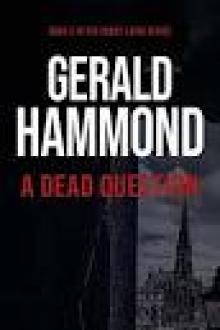 A Dead Question
A Dead Question Twice Bitten
Twice Bitten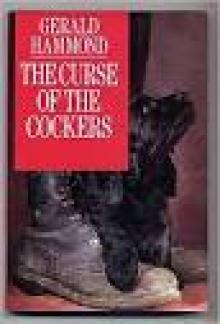 The Curse of the Cockers
The Curse of the Cockers In Loving Memory
In Loving Memory Illegal Tender (Three Oaks Book 12)
Illegal Tender (Three Oaks Book 12) Cold Relations (Honey Laird Book 1)
Cold Relations (Honey Laird Book 1)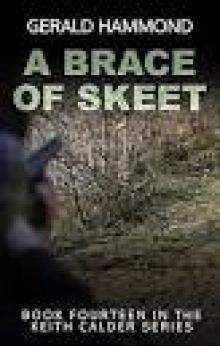 A Brace of Skeet
A Brace of Skeet Silver City Scandal
Silver City Scandal Sauce For the Pigeon
Sauce For the Pigeon Cold Relations
Cold Relations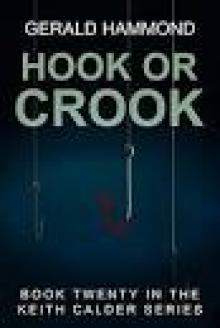 Hook or Crook
Hook or Crook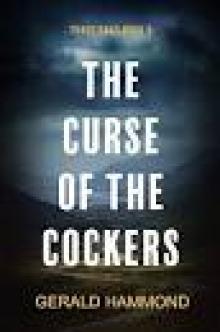 The Curse of the Cockers (Three Oaks Book 5)
The Curse of the Cockers (Three Oaks Book 5) Snatch Crop
Snatch Crop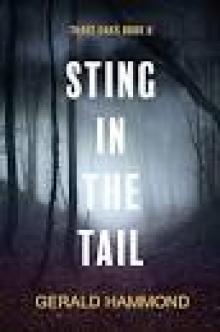 Sting in the Tail (Three Oaks Book 6)
Sting in the Tail (Three Oaks Book 6)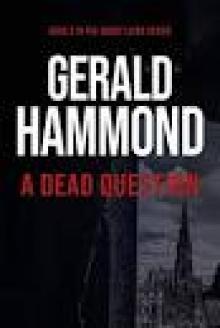 A Dead Question (Honey Laird Book 2)
A Dead Question (Honey Laird Book 2) In Loving Memory (Honey Laird Book 3)
In Loving Memory (Honey Laird Book 3) Thin Air
Thin Air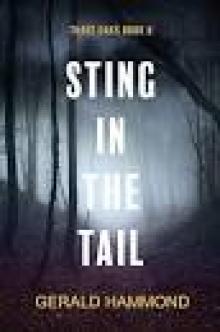 Sting in the Tail
Sting in the Tail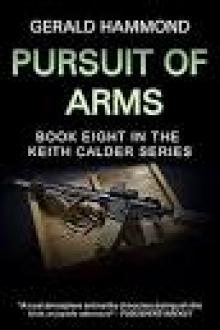 Pursuit of Arms
Pursuit of Arms The Game
The Game Give a Dog a Name (Three Oaks Book 4)
Give a Dog a Name (Three Oaks Book 4) Fair Game
Fair Game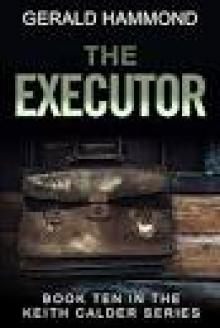 The Executor (Keith Calder Book 10)
The Executor (Keith Calder Book 10) Whose Dog Are You? (Three Oaks Book 2)
Whose Dog Are You? (Three Oaks Book 2)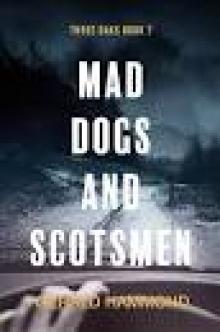 Mad Dogs and Scotsmen (Three Oaks Book 7)
Mad Dogs and Scotsmen (Three Oaks Book 7) Cousin Once Removed
Cousin Once Removed The Worried Widow
The Worried Widow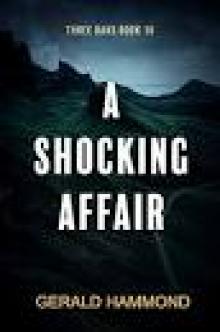 A Shocking Affair
A Shocking Affair Dead Weight (Three Oaks Book 11)
Dead Weight (Three Oaks Book 11) Whose Dog Are You
Whose Dog Are You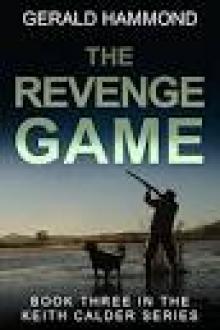 The Revenge Game
The Revenge Game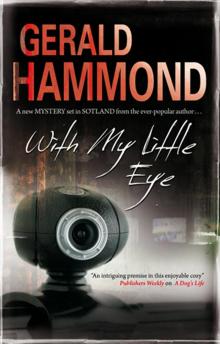 With My Little Eye
With My Little Eye Doghouse (Three Oaks Book 3)
Doghouse (Three Oaks Book 3)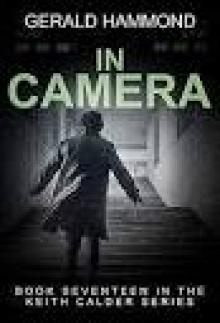 In Camera
In Camera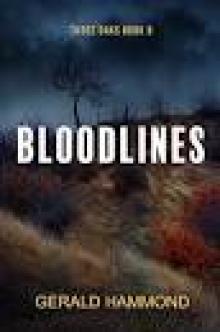 Bloodlines (Three Oaks Book 8)
Bloodlines (Three Oaks Book 8)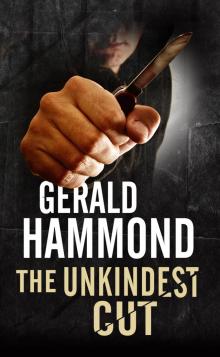 The Unkindest Cut
The Unkindest Cut